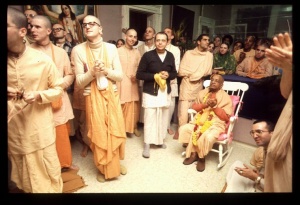SB 7.7.39

A.C. Bhaktivedanta Swami Prabhupada
TEXT 39
rāyaḥ kalatraṁ paśavaḥ sutādayo
gṛhā mahī kuñjara-kośa-bhūtayaḥ
sarve 'rtha-kāmāḥ kṣaṇa-bhaṅgurāyuṣaḥ
kurvanti martyasya kiyat priyaṁ calāḥ
SYNONYMS
rāyaḥ—wealth; kalatram—one's wife and feminine friends; paśavaḥ—domestic animals like cows, horses, asses, cats and dogs; suta-ādayaḥ—children and so on; gṛhāḥ—big buildings and residences; mahī—land; kuñjara—elephants; kośa—treasury house; bhūtayaḥ—and other luxuries for sense gratification and material enjoyment; sarve—all; artha—economic development; kāmāḥ—and sense gratification; kṣaṇa-bhaṅgura—perishable in a moment; āyuṣaḥ—of one whose duration of life; kurvanti—effect or bring; martyasya—of one who is destined to die; kiyat—how much; priyam—pleasure; calāḥ—flickering and temporary.
TRANSLATION
One's riches, beautiful wife and female friends, one's sons and daughters, one's residence, one's domestic animals like cows, elephants and horses, one's treasury, economic development and sense gratification—indeed, even the lifetime in which one can enjoy all these material opulences—are certainly temporary and flickering. Since the opportunity of human life is temporary, what benefit can these material opulences give to a sensible man who has understood himself to be eternal?
PURPORT
This verse describes how the advocates of economic development are frustrated by the laws of nature. As the previous verse asks, kiṁ viṣayopapādanaiḥ: what is the actual benefit of so-called economic development? The history of the world has factually proved that attempts to increase economic development for bodily comfort through the advancement of material civilization have done nothing to remedy the inevitability of birth, death, old age and disease. Everyone has knowledge of huge empires throughout the history of the world—the Roman Empire, the Moghul Empire, the British Empire and so on—but all the societies engaged in such economic development (sarve 'rtha-kāmāḥ) have been frustrated by the laws of nature through periodic wars, pestilence, famine and so on. Thus all their attempts have been flickering and temporary. In this verse, therefore, it is said, kurvanti martyasya kiyat priyaṁ calāḥ: one may be very proud of possessing a vast empire, but such empires are impermanent; after one hundred or two hundred years, everything is finished. All such positions of economic development, although created with great endeavor and hardship, are vanquished very soon. Therefore they have been described as calāḥ. An intelligent man should conclude that material economic development is not at all pleasing. The entire world is described in Bhagavad-gītā as duḥkhālayam aśāśvatam (BG 8.15)—miserable and temporary. Economic development may be pleasing for some time, but it cannot endure. Thus many big businessmen are now very morose because they are being harassed by various plundering governments. In conclusion, why should one waste his time for so-called economic development, which is neither permanent nor pleasing to the soul?
On the other hand, our relationship with Kṛṣṇa, the Supreme Personality of Godhead, is eternal. Nitya-siddha kṛṣṇa-prema. The pure souls are eternally in love with Kṛṣṇa, and this permanent love, either as a servant, a friend, a parent or a conjugal lover, is not at all difficult to revive. Especially in this age, the concession is that simply by chanting the Hare Kṛṣṇa mantra (harer nāma harer nāma harer nāmaiva kevalam (CC Adi 17.21)) one revives his original relationship with God and thus becomes so happy that he does not want anything material. As enunciated by Śrī Caitanya Mahāprabhu, na dhanaṁ na janaṁ na sundarīṁ kavitāṁ vā jagad-īśa kāmaye (CC Antya 20.29, Śikṣāṣṭaka 4). A very advanced devotee in Kṛṣṇa consciousness does not want riches, followers or possessions. Rāyaḥ kalatraṁ paśavaḥ sutādayo gṛhā mahī kuñjara-kośa-bhūtayaḥ. The satisfaction of possessing material opulences, although perhaps of a different standard, is available even in the lives of dogs and hogs, who cannot revive their eternal relationship with Kṛṣṇa. In human life, however, our eternal, dormant relationship with Kṛṣṇa is possible to revive. Therefore Prahlāda Mahārāja has described this life as arthadam. Consequently, instead of wasting our time for economic development, which cannot give us any happiness, if we simply try to revive our eternal relationship with Kṛṣṇa, we will properly utilize our lives.